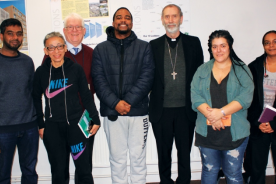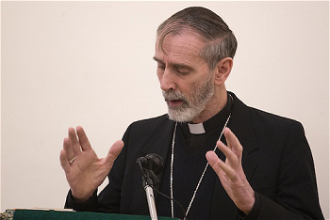Text: Bishop McMahon at Mass for Migrants - 'not charity but justice'

Procession before Mass
Bishop Thomas McMahon, Bishop of Brentwood, gave the following homily today at the Mass for Migrants at Southwark Catholic Cathedral.
I chose the Old Testament lesson, hidden in the later chapters of Jeremiah (36 : 21 – 26) because it contains a story that does not often get the audience it deserves.
The prophet Jeremiah, whose task was so challenging both to himself and to his hearers, that tradition has it that he was put to death to silence his message, he creates a scroll on which his prophetic words are written down. This scroll ultimately finds its way into the palace of the King of Judah, where it is read to the King as he sits by the fire. The King doesn’t like what he hears and so takes a knife and cuts away at the scroll and burns the strong words of the prophet in an attempt to silence the message. We hear an echo of this in the Gospel where Jesus tells us that a prophet is never welcome in his own country.
How different from ancient legend which speaks of an isolated Kingdom where the grain harvest one year turns poisonous. Everyone who eats it will become mad, yet there is no other food available. Finally, the King turns to a trusted councillor and says: “We must all eat or we will die. But you,” he said: “try to eat less. Preserve enough sanity to enable you to remind us through the long dark period ahead that we are mad; tell us again and again the time will come when we are sane again.”
Prophetic voices challenge us. St Hilary of Poitiers wrote in the 4th century: “Where caution is everywhere, courage is nowhere to be found. Our ancestors were not so quiescent; we shall die of prudence yet, you will see”.
History has never lacked voices to tell out the unwelcome message. I think of Aung San Suu Kyi, the Burmese political prisoner under house arrest for so many years in an attempt by the authorities to silence the message. Last year the Nobel Peace prize was awarded to Liu Xiaobo whilst in prison in China for criticising the abuse of human rights in that country.
This year has seen a remarkable number of people taking to the streets. There were a quarter of a million people in London recently protesting against the cuts. But I think especially of the Middle East and North Africa. In those parts of the world it takes great courage for ordinary people to take to the streets. It always takes courage to stand up for what we know to be right.
Hundreds of thousands took to the streets when the Pope visited this country last September and they created great energy for one another in doing so. Pope Benedict said to the Bishops in Birmingham: “That the prophetic voice of Christians has an important role in highlighting the needs of the poor and disadvantaged who can so
easily be overlooked in the allocation of limited resources”. The Holy Father urged all of us to be examples of faith in public life and said that society needed clear voices in what the Chief Rabbi described as: “our short attention span – hyperactive – information saturated – wisdom-starved age”.
Over the years citizens who come to these kind of gatherings have always shown themselves to have ‘clear voices’. Today we celebrate the 10th anniversary of the Living Wage campaign. The first prophetic all for a Living Wage was by Pope Leo XIII in 1891 when he spoke out against the treatment of labour as a commodity. This is what he said: “Wages ought not to be insufficient to support a frugal and good wage earner. If through necessity or fear of a worse evil the worker accepts harder conditions because an employer or contractor will afford them no better, then the worker is made the victim of force and injustice”.
Cardinal Manning known as the friend of workers, spelt out that principle by saying that: “A workers wage should be sufficient to keep his wife and children, to provide them with decent housing and a healthy diet and to educate them”. Since then the Churches and especially Catholic Social teaching have always focused on the ‘person’ and called for dignity and justice for the worker. On the other hand the Market always focuses on ‘profit’ and how to maximise gain.
Like many here, I am proud to have been part of different gatherings organised by Telco over the last ten years pressing for a Living Wage. I recall a particular occasion in 2006 when a number of us interviewed Sir John Bond, Chairman of HSBC.
A cleaner from his bank, paid less than the minimum wage, was also present. As Sir John sang out the praises of the Bank for giving large sums away to Charity each year, I was moved to retort: “Sir John, we are not here to talk about Charity but to talk about Justice”. I am glad to say that thanks to your campaigning he, and many others, have changed over these ten years. But it still remains a scandal and deeply unjust when ordinary workers and especially migrant workers are exploited, taken advantage of and paid less than a living wage. It affronts their dignity, their self-worth and that of their families. After this Mass we march to Westminster Central Hall. On a previous occasion I pointed out that the niches of Westminster Abbey alongside were recently filled with figures of 20th century martyrs from every continent and Christian tradition. People like Martin Luther King, Archbishop Romero. They were honoured and chosen to represent the values which they witnessed to and died for – truth, justice, peace, freedom, love of the poor. Many of them were murdered in order to silence the message, rather like the King burning the scroll, but the message cannot be silenced.
And so, may we, in solidarity with the many others
- Take to the streets
- Raise our voices
- Stand up for Gospel values.
Amen.


















